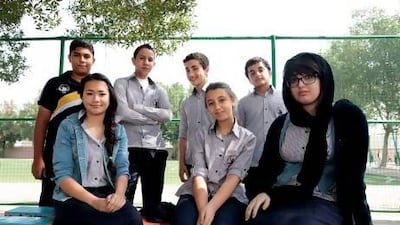DUBAI // The story begins with a young boy, lonely and neglected, who struggles through his youth and does not finish his education. Despite this, he finds a happy ending.
“In the end his uncle comes to him and tells him, I will let you study all over again,” says the author, Mohammed Zouheir, 16, a pupil at American International School. When the boy in his story grows up he confronts his parents about their treatment of him as a child.
Mohammed is one of many school pupils in Dubai who have tackled thorny topics such as child neglect, domestic abuse and school violence for a competition sponsored by the Community Development Authority.
The authority’s 2nd annual Student Contest on Human Rights prompts schoolchildren to think critically and use their creative talents.
Focused this year on children’s rights, the competition is divided into an arts section – with painting, calligraphy and photography categories – and a literature section, for short stories and articles in Arabic. Pupils discuss children’s rights in class and then write or depict their own interpretations.
“As a part of our work in the human-rights sector we want to build awareness about human rights,” said Ayesha Al Marri of the Community Development Authority. “Last year we concentrated on the Universal Declaration of Human Rights … so it was general.”
The initiative has been expanded from only government schools to 151 private schools and 11 centres for people with disabilities, along with 79 government schools. Winners will be announced in May.
At the American International School, about 120 children took part in the contest. Mohammed’s story is one of seven projects going into the larger competition.
“I’m very proud,” said Mohammed, from Morocco. “It is the first time I wrote a story on my own.”
While non-Arabic speaking students participated, all seven projects going forward are stories or articles in Arabic.
Wafa Al Qealy, 15, from Yemen, wrote about physical abuse in families. She chose the topic because “Arab society suffers from lots of home violence towards children. It might help other people learn”.
Nadia Alaa, 14, from Egypt, found inspiration close to home, and wrote about her mother’s journey to overcome past abuse.
“If someone is suffering from physical or mental abuse they tend to be isolated.” Nadia said. “But my mother was an exception.”
Rita Al Khatib, 12, from Syria, wrote an article comparing children who have “their full rights” with children who are deprived. “All children have the right to be saved during a natural disaster, and also all children have to grow with their parents and be respected,” she said.
Teachers at the American International School already address the topic of children’s rights in class. The competition complemented their efforts, said Reem Husein, boy’s section supervisor and the school’s Unesco coordinator. “I need all the kids in my life to know everything about their rights,” she said.
Called into Ms Husein’s office, 11-year-old Yousif, who did not participate in the competition, rattled off a list of reasons children should learn their rights. “It is important for each person so they can defend themselves,” he said. “They can depend on themselves. Also when they will grow up, they will be much better than others.”
As another thought came to him, Yousif asked if he could say one more thing: “If anyone beat me, if I didn’t come talk with our teacher to tell her – every day he will just beat me again.”

